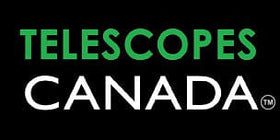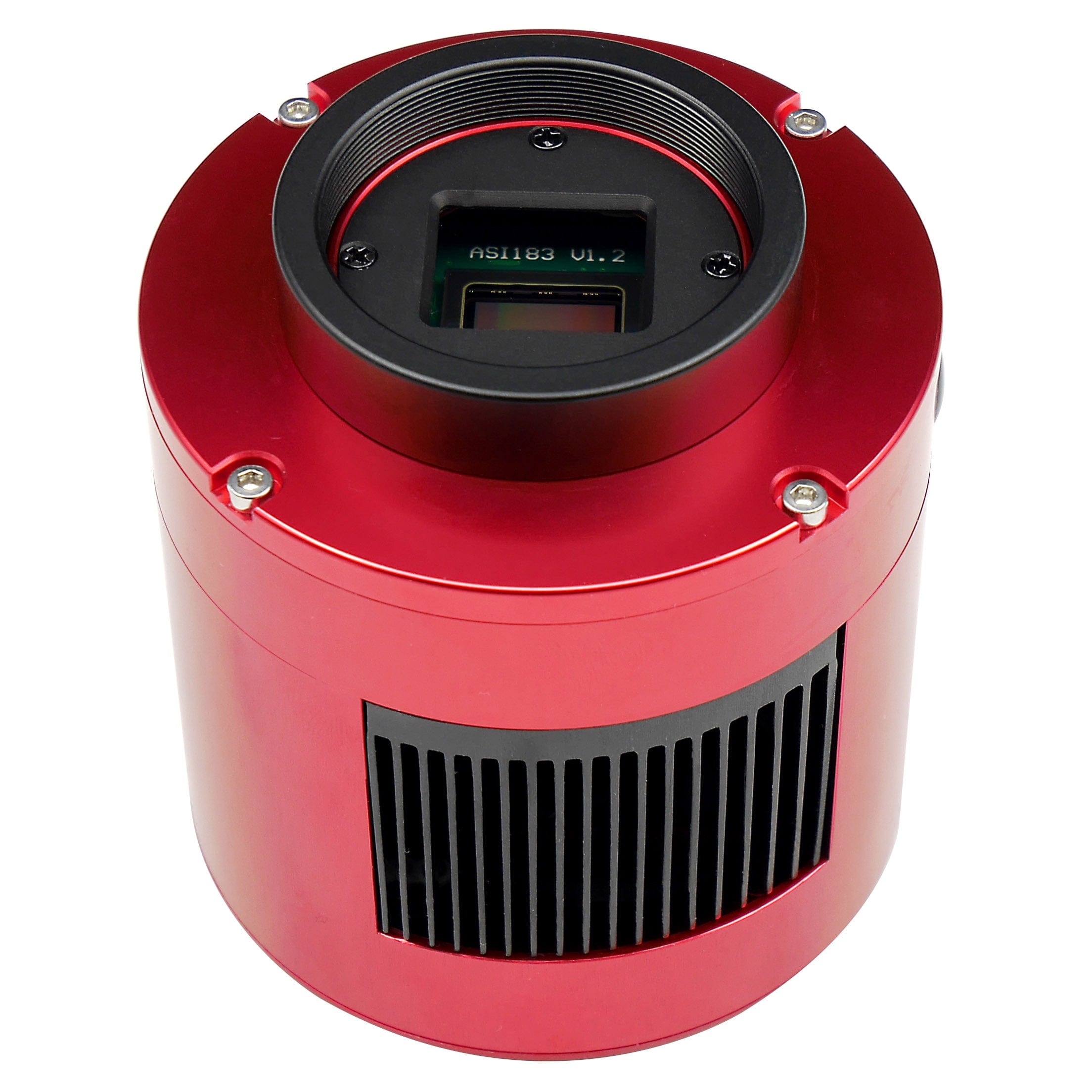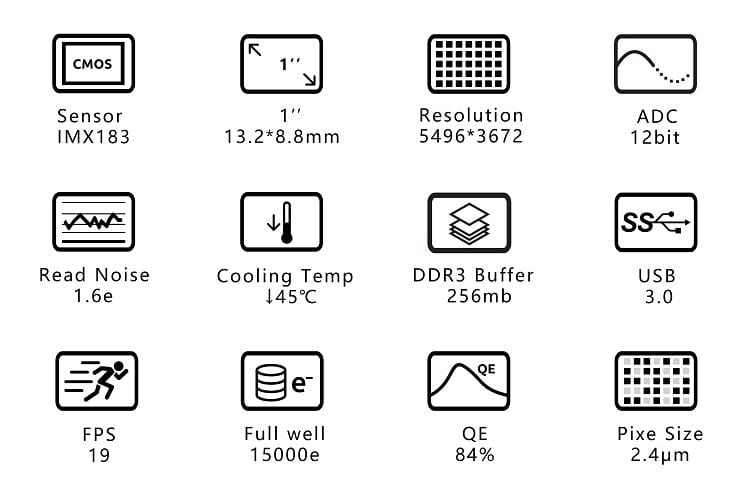Description
Note:ZWO Cooled cameras require a 12V power source for the TEC cooler and USB hub power. If you don't have one, please add it through the options on the right side of the product display.
ASI183MC Pro uses Sony's IMX183CQJ-J sensor. With a high QE-value and low provides excellent image quality at an affordable price. Some of the features include:
- 20.5 megapixel sensor with 2.4 μm pixel size. – able to capture19 frames/s frame rate in 12-bit mode with high detail
- Very low 6e- readout noise – bringing out more details in your images with improved dynamic range
- Full-well capacity of 15ke– – reduces the risk of oversaturated stars in longer exposures
This back-illuminated, rolling shutter-type CMOS sensor has a diagonal of 15.86 mm and approximately 20.2 megapixels.
 High-Speed and High-Picture-Quality Rolling Shutter-Type Back-Illuminated CMOS Image Sensors
High-Speed and High-Picture-Quality Rolling Shutter-Type Back-Illuminated CMOS Image Sensors
Designed for astrophotography, the Sony IMX183CLK-J (monochrome) and IMX183CQJ-J (color) sensors use high sensitivity back-illuminated structures with high resolution 2.4 μm square pixels. The optical size is 1 inch.
DDR Memory Buffer
The ASI183 Pro camera includes a 256MB DDR3 memory buffer to help improve data transfer reliability. Additionally, the use of a memory buffer minimizes amp-glow, which is caused by the slow transfer speeds when the camera is used with a USB 2.0 port.
The DDR memory buffer is the main difference between ASI "Cool" and "Pro" cameras.
DDR memory buffer is the main difference between ASI "Cool" and "Pro" cameras.
Astrophotography Performance
The ASI183 cameras has an impressive list of characteristics suited for astrophotography including a large full well capacity of 15000 e-, small pixel size, 1.6e read noise @ 30dB, and 12 stops dynamic range @ Gain=0. The ASI183 cameras also utilize firmware features to minimize amplifier glow for maximum performance in astrophotography.
Reliable Mechanics
ASI183 Pro has same mechanics as ASI1600 Pro. There are four screws that seal the sensor chamber. Our camera design has been extensively tested and is very stable even in demanding environments.
Even when used in environments with higher humidity, ASI183 Pro will still work fine without dew problems.
High Speed
Fast FPS and high-speed readout come in handy for many applications in astrophotography such as in
- solar and lunar imaging,
- as well as for live viewing or electronically assisted astronomy (EAA)
- real-time focusing,
- true lucky imaging of double stars and other small objects,
- planetary imaging of the major planets in the solar system, and much more.
10Bit ADC
5496×3672 19fps
3840×2160 41.04fps
1920×1080 80.10fps
1280×720 117.30fps
12bit ADC
5496×3672 19fps
3840×2160 36.12fps
1920×1080 70.48fps
1280×720 103.23fps
High QE
Sony's back-illuminated Exmor R technology, giving it excellent Deep Sky performance. ASI183 QE peak reaches a respectable 84%. In Ha channel, QE is still over 60%.
Having high QE means that more of the light that enters your telescope and reaches the sensor is actually used. With 84% peak Q.E. and no less than ~50% within the visible spectrum, the ASI183 will utilize a high percentage of the light that reaches it, improving your signal quality.
Dark Current
The dark current of the ASI183 is extremely low, based on our test results.
Dark frame sample @ Highest dynamic range settings(gain=0), 300s, -10°C, bin1. Please check the dark frame to make sure you are fully aware of the performance.
Notice: For the possible amp glow that shows on your images, please refer to this tutorial: "What is Amp-glow and how do I manage it? "
https://astronomy-imaging-camera.com/faq
USB 3.0 Port & USB2.0 HUB
USB 3.0 Port: Provide 5Gb bandwidth to make it possible for ASI183 Pro to run at 19 fps (12bit, normal mode) or 19 fps (10bit, high speed mode) at full resolution(20.18Mega).
USB 2.0 HUB: can connect with various accessories, such as filter wheel, guide camera and electronic focuser, so you can better manage your cables. The ASI183 Pro includes two short 0.5m USB 2.0 cables. The integrated USB 2.0 hub is powered by the external power source if you connect one.
Cooling System
Thanks to the two stage TEC cooling, ASI183MC Pro can lower the sensor temperature to 40-45 degrees Celsius below ambient temperature, which can greatly reduce dark current generation and sensor noise even during extended exposure times.
*The Delta T 40-45℃ is tested at 30℃ ambient temperature. It might get down when the cooling system is working for a long time. Also, as the ambient temperature falls, the Delta T would also decrease.
Please notice that the camera needs to be connected to an external 11-15v power supply to implement the cooling function. We recommend you use 12V@3A DC adapter (5.5*2.1mm, center pole positive) or lithium battery with 11-15V to power the camera. If you don't have one, please click here to buy a 12V power adapter. There are 4 different standards for different countries, please make sure you selected the correct adapter when placing the order.
Connecting Diagram
1. M43-T2 adapter
2. EOS-T2 adapter
3. 2"Filter (optional)
4. 1.25" T-Mount
5. 1.25" Filter (optional)
6. M42-1.25" adapter (optional)
7. T2 extender 11mm
Mechanical Diagram
What is in the box?
ASI183 Pro box includes all necessary cables, adapters, and manuals.
Spacer thickness: 0.1mm *1+0.2mm *2+0.5mm *1
The best solution of 55mm back focus length
Read more:https://astronomy-imaging-camera.com/tutorials/best-back-focus-length-solutions-55mm.html
Product review:
https://www.cloudynights.com/topic/599475-sony-imx183-mono-test-thread-asi-qhy-etc/













